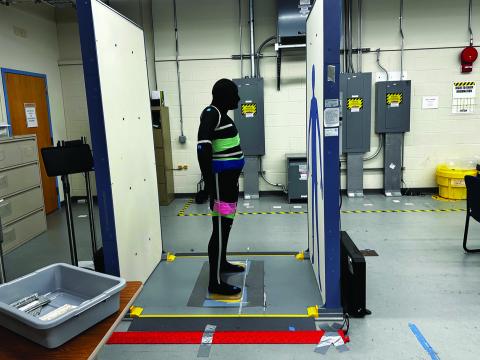Border Security Investments Paying Off
Contrary to popular belief, illegal crossings along the southern border of the United States are at their lowest levels since the 1970s, according to Jeh Johnson, secretary of the Homeland Security Department (DHS), who is calling on Congress to pass a 2015 appropriations bill to fund additional security measures for border protection and homeland security.
In a DHS progress report before the Woodrow Wilson International Center for Scholars this morning, Johnson reported that apprehensions along the southern border have dropped to about 400,000 per year, down from 1.6 million in 2000. Apprehensions, he pointed out, are a direct indicator of the overall number of illegal border infiltrations.
While other factors play a role in the lower number of apprehensions, Johnson contended that investments made in border security are paying off. “These numbers are no doubt partially due to economic conditions and trends in the United States, Mexico and Central America, but are also due to the very large investment this country has made in border security over the last 15 years. Today’s border patrol has the largest deployment of people, vehicles, aircraft, boats and equipment along the border in its 90-year history,” he said, adding the investment includes $3.5 billion and more than 20,000 border patrol agents.
The DHS secretary said the department is taking a “threat-based approach” to border security, but it needs more equipment to get the job done. “This means focusing resources where our intelligence and surveillance tell us the threats exist. This is a smart, effective and efficient use of taxpayer resources. There are more aircraft, surveillance, radar technology and other equipment that experts have determined we need and that we’ve requested for fiscal year 2015,” Johnson stated.
He then appealed to lawmakers to pass an appropriations budget that does not use the department’s budget as a political football. “As originally introduced by the House Appropriations Committee, the Fiscal Year 2015 appropriations bill for the department was a good bill. It appropriated $39.7 billion for the department. It funded many of the things we need. On the House floor, the bill was amended to include politically charged language to de-fund all of our executive actions to fix the immigration system. The president has vowed to veto any bill that includes such language,” Johnson explained.
The department currently is funded through a continuing resolution (CR) that ends February 27. “As long as we’re on a CR, we’re restricted to last year’s spending levels and cannot engage in any new spending activities. This means we cannot pay for the added border security I talked about. This means we cannot invest in the things the independent panel recommended to improve the Secret Service. We cannot hire Secret Service agents for the coming presidential election cycle,” Johnson declared. “Our ability to fund aviation security, maritime security, port security and homeland security is severely constrained as long as we’re on a CR.”
He indicated the potential for attempted illegal border crossings to rise again. “The poverty and violence that are the push factors in Honduras, Guatemala and El Salvadore still exist. The economy in this country, a pull factor, is getting better. There is still more we can and should do,” he stated.
DHS is implementing a department-wide effort to increase border security that includes Customs and Border Protection, Immigration and Customs Enforcement, Citizenship and Immigration Services and the Coast Guard. The department also has established three new task forces to continue improving border security. “Joint Task Force East will be responsible for our maritime ports and approaches across the Southeast. Joint Task Force West will be responsible for our Southwest land border and the West coast of California. The third will be a standing Joint Task Force for Investigations to support the work of the other two task forces,” Johnson offered.
The department faced a challenge last summer with “unprecedented numbers of unaccompanied children and others who crossed a narrow area of our southern border in the Rio Grande valley in search of a family member and a better life in this country,” he acknowledged, adding that officials “responded aggressively with more people and resources on the southern border.” In mid-June, the numbers of unaccompanied children crossing the southern border declined sharply and are now at far lower levels, he said.
In addition, Johnson reiterated his pledge from a year ago that “as long as I’m secretary, counterterrorism will remain a cornerstone of the Department of Homeland Security’s mission.”
The world now is in a “new phase” in the global terrorist threat, Johnson told the audience. “Today the terrorist threat is more decentralized, more diffuse and more complex. We are concerned about the so-called foreign fighter who leaves his home country, travels to another country to take up the fight there, links up with terrorist extremists and may return home, whether it’s this country or one of our allies, with a terrorist extremist purpose.”
The ever-improving Internet skills displayed by some terrorists also presents a challenge, according to Johnson. “We are concerned about terrorist organizations’ new and slick use of the Internet to publicly recruit individuals to conduct attacks within their own homelands,” he said, citing the Al Qaeda in the Arabian Peninsula group that publicizes bomb-making instruction manuals online.
“We are concerned about the domestic-based threat lurking in our midst, the so-called lone wolf, who may become inspired by this propaganda on the Internet and can strike with little or no notice,” he continued.
Johnson lauded the visa waver program the United States has offered to 38 nations to boost international commerce and travel, but he said the government is taking steps to improve the program’s security. “Last November, we identified added information fields to the electronic system for travel authorization to learn more about those who travel to the United States from countries for which we do not require a visa. We’re considering further security enhancements to the program. We’re engaging our allies in Europe and elsewhere to encourage them to maintain and share travel information about individuals of suspicion,” he stated.
Furthermore, the department is sharing more information and training with state and local law enforcement. “Given the manner in which the terrorist threat is evolving, the cop on the beat must be as vigilant as the intelligence analyst,” Johnson said. In 2014, for example, DHS held more than 70 meetings in cities around the country with Johnson personally participating in sessions in meetings in Chicago, Minneapolis, Boston, Los Angeles and Columbus, Ohio.





Comments